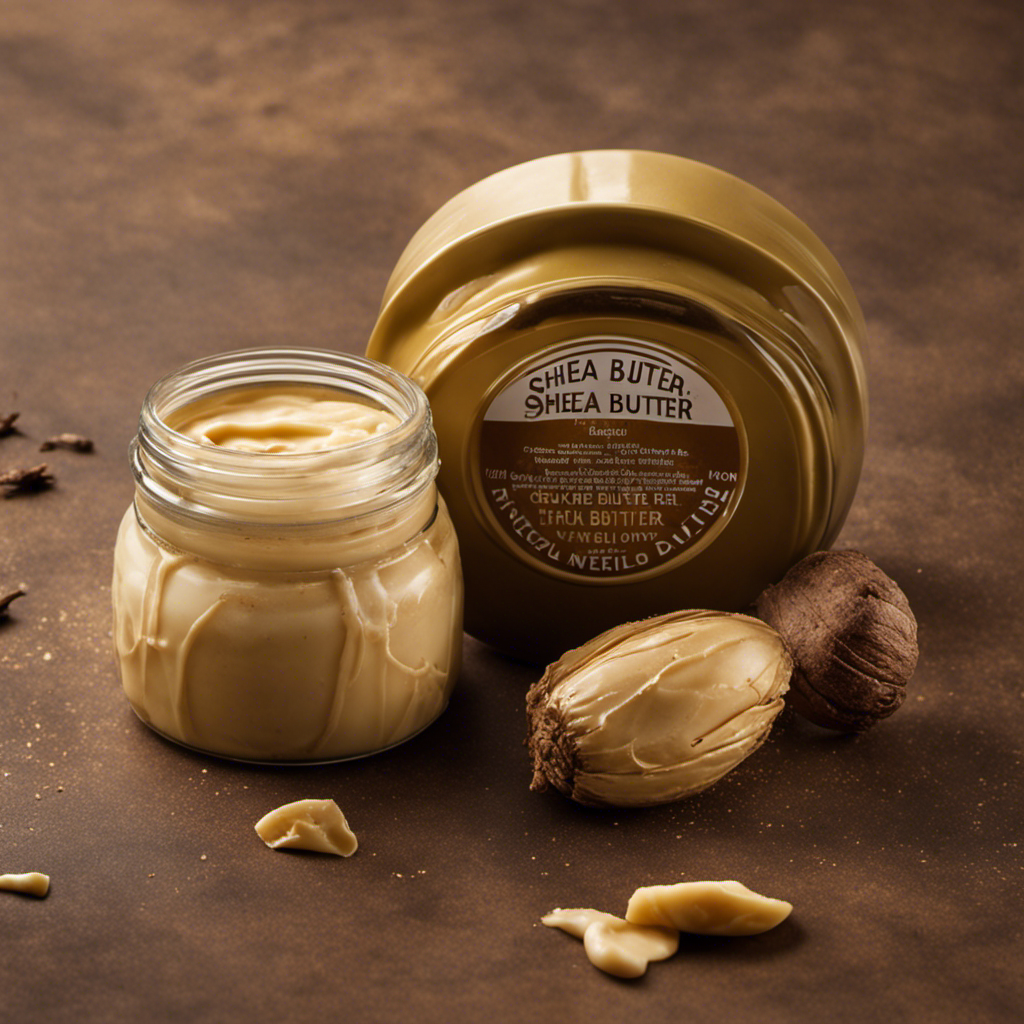Are you interested in learning more about what plant-based butter actually is? Allow me to provide you with all the details.
Plant based butter is a dairy-free alternative made from various plant oils and fats. In this article, we’ll explore the basics of plant based butter, discuss the different types available, and delve into the nutritional benefits it offers.
We’ll also explore how to use plant based butter in recipes and compare it to traditional dairy butter.
So, let’s dive in and discover the world of plant based butter together!
Key Takeaways
- Plant based butter is a dairy-free alternative made from plant oils and fats.
- It provides a similar taste and texture to traditional butter without any animal products.
- There are different types of plant based butter available, including soy-based, coconut-based, and almond-based spreads.
- Plant based butter brands like Earth Balance offer healthier fats, are lower in cholesterol, and are suitable for vegan or plant-based diets.
The Basics of Plant Based Butter
If you’re new to plant-based butter, let’s start with the basics.
Plant-based butter, also known as plant-based margarine, is a type of spread made from vegetable oils instead of animal fats. It is a popular choice among those following a vegan or dairy-free diet, as it provides a similar taste and texture to traditional butter without any animal products.
There are several types of spreads available in the market, including soy-based, coconut-based, and almond-based options. Each type has its own unique flavor profile and nutritional benefits.
Plant-based butter can be used in the same way as regular butter, whether it’s for spreading on toast or baking in your favorite recipes. It’s a versatile and delicious alternative for those looking to reduce their consumption of animal products.
Types of Plant Based Butter
When it comes to plant-based butter, there are several popular brands on the market that offer a variety of options. These brands, such as Earth Balance, Miyoko’s, and Country Crock, have gained popularity among those following a plant-based diet.
In terms of nutritional benefits, plant-based butters tend to be lower in saturated fat and cholesterol compared to traditional butter, and they often contain heart-healthy fats from sources like nuts and seeds.
However, making homemade plant-based butter can also be a great option for those who prefer a more personalized and cost-effective approach.
Popular Plant-Based Brands
One of the most popular plant-based butter brands is Earth Balance. They offer a range of vegan butter alternatives that are made from plant-based spreads.
Here are three reasons why Earth Balance is a top choice for those seeking a dairy-free butter substitute:
-
Variety: Earth Balance offers a wide range of flavors and varieties, including original, soy-free, olive oil, and coconut oil spreads. This ensures that there is a butter alternative to suit everyone’s taste preferences.
-
Quality Ingredients: Earth Balance uses high-quality, non-GMO ingredients in their plant-based spreads. They are also free from artificial flavors, preservatives, and trans fats, making them a healthier choice for consumers.
-
Versatility: Earth Balance spreads can be used in a variety of ways, just like traditional butter. Whether you’re spreading it on toast, using it in baking, or melting it over vegetables, Earth Balance provides a versatile option for all your culinary needs.
With its wide range of flavors, quality ingredients, and versatility, Earth Balance has become a go-to brand for those looking for delicious and reliable vegan butter alternatives.
Nutritional Benefits Compared
When comparing nutritional benefits, you’ll find that Earth Balance spreads offer a healthier option compared to traditional butter.
Plant-based spreads like Earth Balance are made from natural oils, such as vegetable or coconut oil, which contain healthier fats compared to the saturated fats found in butter.
These spreads are also lower in cholesterol and free from trans fats, making them a better choice for heart health.
Additionally, Earth Balance spreads are often fortified with essential vitamins and minerals, such as vitamin B12 and vitamin D, which are typically not found in butter. This makes them a great option for those following a vegan or plant-based diet.
Overall, the nutritional comparison clearly shows the health advantages of choosing plant-based spreads like Earth Balance over traditional butter.
Homemade Plant-Based Butter
To make your own plant-based spread at home, all you need are natural oils, such as vegetable or coconut oil, and some essential vitamins and minerals for added health benefits. Here are three homemade butter alternatives that you can try:
-
Cashew Butter: Soak cashews in water overnight, then blend them with coconut oil, a pinch of salt, and a splash of lemon juice. This creamy spread is rich in healthy fats and protein.
-
Avocado Butter: Mash ripe avocados with olive oil, garlic powder, and a squeeze of lime juice. Avocado is packed with monounsaturated fats, which are good for heart health.
-
Almond Butter: Roast almonds in the oven, then blend them with a little bit of sweetener like maple syrup and a touch of vanilla extract. This nutty spread is high in vitamin E and magnesium.
Making your own plant-based spreads allows you to control the ingredients and customize the flavors to your liking. Plus, they are a healthier alternative to traditional butter. Try these recipes and enjoy the benefits of homemade butter alternatives.
Nutritional Benefits of Plant Based Butter
Plant based butter offers a variety of nutritional benefits, such as being cholesterol-free and containing healthy fats. This alternative to traditional butter is made from plant oils, such as olive oil or coconut oil, and is a great option for those looking to reduce their intake of saturated fats.
Here is a taste comparison between plant based butter and traditional butter:
| Nutritional Benefits of Plant Based Butter | Traditional Butter |
|---|---|
| Cholesterol-free | Contains cholesterol |
| Contains healthy fats | High in saturated fats |
| Rich in omega-3 fatty acids | Low in omega-3 fatty acids |
| Good source of vitamin E | Low in vitamin E |
| Lower in calories | Higher in calories |
As you can see, plant based butter provides health benefits while still offering a similar taste and texture to traditional butter. It is a versatile and delicious option for those looking to make healthier choices in their diet.
How to Use Plant Based Butter in Recipes
Using plant-based butter in recipes can enhance the flavor and texture of your favorite dishes without sacrificing the health benefits. Here are some tips for incorporating plant-based butter into your cooking:
-
Baking: Replace dairy butter with plant-based butter in your favorite baked goods like cookies, cakes, and muffins. It will provide the same creamy texture and rich flavor.
-
Sauteing and frying: Use plant-based butter as a substitute for dairy butter when sauteing vegetables or frying foods. It will add a delicious buttery taste to your dishes.
-
Spreading: Spread plant-based butter on toast, bagels, or pancakes for a tasty and dairy-free alternative. It melts just like regular butter and is perfect for adding a touch of creaminess.
Incorporating plant-based butter into your vegan diet offers numerous benefits, including reducing saturated fat intake and promoting heart health.
Now let’s compare plant-based butter to dairy butter to see how they stack up.
Comparing Plant Based Butter to Dairy Butter
When it comes to comparing plant-based butter to dairy butter, there are two key points to consider: the health benefits and the taste and texture.
Plant-based butter offers several health benefits, such as being cholesterol-free and lower in saturated fat.
Additionally, it is important to evaluate the taste and texture of plant-based butter to see how it compares to traditional dairy butter in various recipes.
Health Benefits of Plant-Based Butter
If you’re looking to improve your health, you’ll be pleased to know that plant-based butter offers numerous benefits. Here are three reasons why plant-based butter substitutes are a great option for your health:
-
Lower in saturated fats: Plant-based butter substitutes are typically made from oils derived from plants like coconut, avocado, or olive. These oils are naturally low in saturated fats, which can be harmful to your heart health when consumed in excess.
-
Rich in healthy fats: While plant-based butter substitutes may be lower in saturated fats, they are often higher in unsaturated fats, such as monounsaturated and polyunsaturated fats. These healthy fats have been linked to improved heart health and reduced inflammation.
-
No cholesterol: Unlike dairy-based butter, plant-based butter substitutes are free from cholesterol. High cholesterol levels can increase the risk of heart disease, so choosing a cholesterol-free option can be beneficial for your cardiovascular health.
In addition to these health benefits, plant-based butter substitutes also have a positive environmental impact. They require fewer resources to produce compared to dairy butter, resulting in lower greenhouse gas emissions and reduced water usage. So, if you’re looking to make a healthier choice for yourself and the planet, plant-based butter substitutes are a great option to consider.
Taste and Texture Comparison
One of the main advantages of plant-based butter substitutes is that they offer a similar taste and texture to traditional dairy butter. When it comes to taste comparison, plant-based butter substitutes have come a long way in replicating the rich and creamy flavor of dairy butter. Many brands use natural flavors and ingredients to achieve this, making it difficult to distinguish between the two.
In terms of texture comparison, plant-based butter substitutes also aim to mimic the smooth and spreadable consistency of dairy butter. They are often made with oils and emulsifiers, allowing them to soften at room temperature and melt easily when heated. This ensures that they can be used in a variety of culinary applications, just like traditional butter.
Transitioning into the next section, if you’re interested in making your own plant-based butter at home, there are several simple recipes that you can try.
Making Your Own Plant Based Butter at Home
You can easily make your own plant-based butter at home. It’s a great alternative for those who follow a vegan or dairy-free lifestyle. Here are three reasons why making vegan butter at home is beneficial:
-
Healthier Ingredients: Plant-based butters are typically made with wholesome ingredients like nuts, seeds, or avocados. These ingredients are rich in healthy fats and nutrients, making the butter a healthier option compared to traditional butter made from animal fats.
-
Customizable Flavors: When making your own plant-based butter, you have the freedom to experiment with different flavors and add-ins. From garlic and herbs to maple syrup and cinnamon, the possibilities are endless. This allows you to create a butter that perfectly suits your taste preferences.
-
Environmentally Friendly: Plant-based butter production has a lower carbon footprint compared to traditional butter production. By making your own vegan butter at home, you can contribute to reducing greenhouse gas emissions and supporting sustainable practices.
Frequently Asked Questions
Are Plant-Based Butters Suitable for Individuals With Dairy Allergies or Lactose Intolerance?
Plant-based butters are suitable for individuals with dairy allergies or lactose intolerance. These alternatives provide a great option for those looking to avoid dairy products. Additionally, plant-based butters offer various health benefits, such as being cholesterol-free and rich in healthy fats.
Can Plant-Based Butters Be Used as a Direct Substitute for Dairy Butter in Baking Recipes?
Yes, plant-based butters can be used as a direct substitute for dairy butter in baking recipes. They offer the benefit of being cholesterol-free and lower in saturated fat, making them a healthier option.
Do Plant-Based Butters Have a Similar Taste and Texture to Dairy Butter?
Plant-based butters offer a comparable taste to dairy butter, but the texture may differ slightly. They are made from plant oils and often contain emulsifiers for a creamy consistency.
Are All Plant-Based Butters Vegan-Friendly?
Yes, all plant-based butters are vegan-friendly. They are made from various plant oils and are a great alternative to traditional butter. They offer health benefits like being cholesterol-free and lower in saturated fat.
What Are Some Common Ingredients Used in the Production of Plant-Based Butter?
Common ingredients in plant-based butter include oils such as coconut or avocado, emulsifiers, and flavorings. Using plant-based butter in cooking offers benefits like being dairy-free and lower in saturated fats, making it a healthier option.
Conclusion
In conclusion, plant-based butter is a game-changer in the world of culinary delights. Its creamy texture and rich flavor make it a perfect substitute for traditional dairy butter.
Whether you’re a vegan, health-conscious, or simply looking for a tasty alternative, plant-based butter is a must-try. With its nutritional benefits and versatility in recipes, it’s like a symphony of flavors dancing on your taste buds.
So why not dive into the world of plant-based butter and let your culinary adventures take flight?









